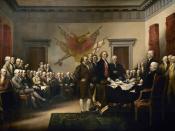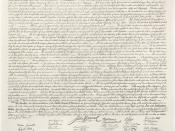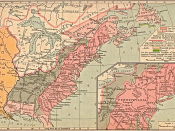1763 marked the end of French and Indian war and caused a great celebration and pride in the American colonies. But, in next twelve years, the same pride was altered by at bitter and violent conflict with the mother country. The injustices of the mother country finally led the American colonists to declare independence and wage war against it. American colonies were justified for waging war and breaking away from Britain because they were defending themselves against a series of measures Parliament wished to impose on their communities without their consent.
To pay for the debts of French and Indian war, Parliament passed various acts. In 1765, the stamp act was passed, which was a direct tax on the colonies and had nothing to do with the trade. In June 1767, Parliament imposed more taxes on the colonies by passing the Townshend Act. These acts infuriated the colonists about George III and they decided to boycott the acts.
The act that really enraged the colonies were the coercive or intolerable acts, that closed the Boston harbor in order to punish the colonists for the Boston tea party. These acts united the colonies against England. To decide on what steps they would take, the colonists met in Philadelphia at First Continental Congress.
By 1776, many Americans had come to believe that an anti-American conspiracy existed in the highest circles of British government. After the First Continental Congress, George III told General Thomas to use force when necessary to make certain the British rule in the colonies was maintained. On April 18, 1775, Gage sent his troops to Lexington to capture the weapons from the minutemen. In 1779, the British tried to execute a plan to capture the state of New York and three armies were to meet each other. At...


